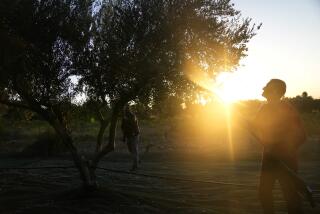Crime Perils Albania, Europe’s Poorest
- Share via
TIRANA, Albania — In ramshackle towns, people stay home after dusk for fear of armed gangs roaming the streets. Students demand protection against rapes and killings in their dormitories. Even the justice minister was robbed.
An overwhelming crime wave threatens to plunge Albania, Europe’s poorest country, into anarchy.
Crime is rising throughout Eastern Europe as the region shakes off decades of iron-fisted Communist rule, but Albania is among the hardest hit by new lawlessness.
Citizens in the Balkan nation of 3 million people fight for scarce land, scramble for ever more expensive food and increasingly revert to the old blood feuds that once dominated northern Albania. In one remote village, a man reportedly killed a man and his son to avenge the theft of a goat.
The police can do little, in part because they lack crime-fighting tools such as fast cars and computers. In addition, the police are despised as instruments of the former authoritarian government of Enver Hoxha.
“The police are closely identified with the repressive Communist regime of the very recent past,” said Mitro Cela, editor of the leading anti-Communist newspaper Rilindja Demokratika, or Democratic Revival. “Fearing reprisals from organized criminals, they will not intervene to maintain order.”
The crimes have been increasing in brazenness as well as number.
Convoys bringing sorely needed foreign food and medical aid have been attacked. Italy sent unarmed soldiers to help distribute its aid package, and special paramilitary troops guard the main base of Italian soldiers in the port of Durres.
Troops patrol major archeological sites, such as Apollonia on the central Adriatic coast, and the major museums to stem a flood of reported art thefts.
Recently, a group of Albanians ambushed a foreigner whose car had crashed into a ditch. They stole everything they could carry, including technical equipment, food, tapes and clothing. They even dismantled and stole parts of the car itself. Police at the scene appeared unable to control the mob, and finally left without assisting the hapless driver.
In late November, the Albanian Parliament held a special session to discuss crime. The government has ordered the newspaper Albapol--put out by the Ministry of Public Order to catalogue crime--to keep appearing despite a paper shortage that has shut down all other publications in recent weeks.
The newspaper reported that even the minister of justice, Shefqet Muci, fell victim to the crime wave. He was robbed at a roadblock manned by “brigands,” it said.
Albania’s desperate poverty helps feed the crime wave. Shock economic reforms, introduced in early November and intended to reverse decades of Communist mismanagement, have worsened already low living standards.
Tens of thousands of people have lost jobs at factories unable to survive without state subsidies. Food prices have rocketed by 100% a week since Nov. 1. The average monthly wage is the equivalent of $20.
More than 50% of the population is under 26 years old. Many are idle and find crime a tempting outlet for their frustrations.
Exacerbating the crisis are disputes over land redistribution in the countryside, where more than 65% of Albanians live. Most are now idle while land ownership is contested.
“The only profession the peasants have at the moment is grabbing materials to mark the land they think belongs to them,” said telecommunications engineer Maxim Gjergj after discovering the theft of 4 miles of newly connected cable between the southern town of Saranda and the Greek border.
Further economic reforms, including suspension of welfare for the unemployed, are due to take effect in coming weeks.
The political future is also uncertain. Premier Ylli Bufi has warned that his coalition government would resign if there is no resolution of a dispute over when to schedule new elections.
More to Read
Sign up for Essential California
The most important California stories and recommendations in your inbox every morning.
You may occasionally receive promotional content from the Los Angeles Times.













